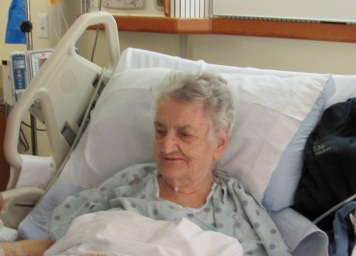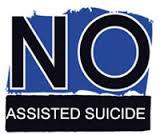|
DEATH
WITH DIGNITY?
Terminally
ill patients in Oregon turned to their state for health care but were
denied
treatment and offered doctor-assisted suicide instead...

IMPORTANT
UPDATE - MARCH 2017 The "Aid in Dying for the
Terminally Ill Act" passed
the full Assembly in October, 2016 and was released from the Senate Health Committee
in early November. It can be added at any time for a Senate voting
session.
THE
NEXT VOTE IN THE SENATE IS SCHEDULED
FOR MARCH 13
Please
tell NJ State Senator Bateman to oppose A2451/S2474.
To send him an email, click
here and follow the link that says "ELECTRONIC MAIL - Contact Your
Legislator(s)". To view a copy of the letter I sent, click
here.
Or
you can use the template letter
provided by NJ Right To Life. Then scroll down and click on the "No
Assisted Suicide" link.

This
year marks the 100th anniversary of Our Lady of Fatima.
A number of events occurred on the 13th of the month.
In addition to writing our letters, let's storm the heavens with our
prayers to stop this bill from being passed.
One day, it could be your parent, or even you, who is affected if this
bill should pass.
*********
Did
you
know?
Some
terminally ill patients in Oregon who turned to their state for health care were
denied
treatment and offered doctor-assisted suicide instead, a proposal some experts
have called a "chilling"
corruption of medical ethics.
For
more details, read my letter -- click here.
TAKE
THE POLL! SHOULD NJ OK PHYSICIAN ASSISTED SUICIDE?
It's
interesting to note that the legislation was originally called the
"Death with Dignity" Act (NJ Senate Bill S382) and now it's
labeled as the "Aid in Dying for the Terminally Ill Act".
Perhaps we should acknowledge what it REALLY is, the "LEGALIZED
SUICIDE FOR THE TERMINALLY ILL ACT"...
The
potential for abuse is staggering. Those
who are terminally ill may feel pressured to end their lives because
they are no longer productive and have become a "burden" to their
family members. The
terminally ill who are elderly and may have limited mental capacity may
have the decision taken out of their hands by guardians who may make
their decisions based on their own personal agenda rather than what's
in the best interest of the patient.
From
what I understand, the physician provides the drug that will kill a
person, but is not necessarily present at the time a person takes it. The person can die alone, or SUFFER from complications.
According
to one web site,
The
Oregon Department of Human Services (DHS) wrote in its Mar. 9, 2006
"Eighth Annual Report on Oregon's Death with Dignity Act":
"In
2005, 39 physicians wrote a total of 64 prescriptions for lethal doses
of medication... Thirty-two of the 2005 prescription recipients died
after ingesting the medication... In addition, six patients who received
prescriptions during 2004 died in 2005 as a result of ingesting the
prescribed medication, giving a total of 38 PAS [physician-assisted
suicide] deaths during 2005. One 2004 prescription recipient, who
ingested the prescribed medication in 2005, became unconscious 25
minutes after ingestion, then regained consciousness 65 hours later.
This person did not obtain a subsequent prescription and died 14 days
later of the underlying illness (17 days after ingesting the
medication)...
Complications
were reported for three patients during 2005; two involved
regurgitation, and, as noted above, one patient regained consciousness
after ingesting the prescribed medication. None involved seizures (see
Complications, page 13). Fifty percent of patients became unconscious
within five minutes of ingestion of the lethal medication and the same
percentage died within 26 minutes of ingestion. The range of time from
ingestion to death was from five minutes to 9.5 hours."
The
debate was discussed:
Do
Euthanasia and Physician-Assisted Suicide Ensure a Good Death?
Russel
Ogden, MA, Criminology Instructor at the Kwantlen Polytechnic
University, wrote in a Dec. 1997 Policy Options article "
Oregon
's Measure 16: A Bitter Pill":
"There
is paucity of research into the dosages and types of drugs necessary to
cause death and no pharmaceutical company has developed a sure-fire
suicide pill... In the course of my own research I have heard horrific
stories of patients taking massive quantities of drugs that have been
fatal with other persons and yet they have either survived or suffered
through lingering deaths. Risks include vomiting the drugs, coma,
psychosis and even de-cerebration where the patient is brain dead but
still breathing. Sometimes these protracted deaths elicit friends or
partners to resort to smothering with pillows or asphyxiation with
plastic bags. One physician reported to me that he took the recourse of
holding shut the mouth and nostrils of a comatose patient."
The
above quotations and further commentary can be found at:
http://euthanasia.procon.org/view.answers.php?questionID=000190
My
own mother had to endure an extended hospital stay because of a reaction
to the medication she was given which impaired her ability to recover.
She lived in another state and I thank God that my sister was
there to be her advocate and she was ultimately able to recover from the
ordeal and return home.
It's
bad enough that innocent lives of children are destroyed because the
parents are selfish and irresponsible (Roe v Wade).
Patients who are in excruciating pain due to their illness and
choose to take medications to alleviate their suffering is one thing,
but to propose "Death with dignity" laws that tell them "it's OK
to kill yourself" is just as irresponsible. We take away the dignity
and self-esteem of the terminally ill by conveying the message that
their life is worthless. We
take away their dignity and self-esteem by forcing "heroic measures"
to prolong their suffering. We
allow all sorts of legally acceptable abuse when children can influence
their parents into thinking "this is the best way".
Where is the dignity in this?
According
to the statement of the Senate Health, Human Services and Senior
Services Committee on 12/15/14 (3rd reprint):
"When a patient
makes an initial oral request for medication under the bill's
provisions, the attending physician is required to provide the patient
with information about the risks, probable results, and alternatives to
taking the medication; recommend that the patient participate in a
consultation concerning additional treatment opportunities, palliative
care, comfort care, hospice care, and pain control options; and refer
the patient to a health care professional who is qualified to discuss
those alternative care and treatment options. The patient may choose,
but is not required, to participate in such consultation...
The attending
physician is required to refer the patient to a consulting physician, in
order to obtain confirmation of the attending physician's diagnosis,
and both the
attending physician and the consulting physician must verify that the
patient is making an informed decision in relation to their request."
http://www.njleg.state.nj.us/2014/Bills/A2500/2270_S4.HTM
How can the patient make an informed decision if he or she
is not required to participate in the consultation?
It sounds to me like a legalized CYA.
Furthermore,
"Any person who coerces or exerts
undue influence on a patient
to request medication under the bill... will be guilty of a crime of the
third degree... The bill provides immunity from civil and criminal liability, and from
professional disciplinary action, for any action that is
undertaken in compliance with the bill..."
My
question is, who is the patient's advocate TO ENSURE THIS WON'T
HAPPEN? I don't see any
language in this bill to explain what steps will be taken to protect the
patient.
WHAT YOU CAN
DO
1. Call and email your
State Senator immediately and urge him/her to Vote No on A2451/S2474.
2. Call and email Governor
Christie and urge him to veto A2451/S2474 if it reaches his desk.
To read my letter to the
Senator, click here.
FYI...
There are 5 States That Have Legalized
Physician-Assisted Suicide:
4
states (CA*, OR, VT, and WA)
legalized physician-assisted suicide via
legislation
*California's law
will take effect 90 days after the state legislature adjourns the
special session on healthcare, which likely will not be until Jan. 2016
at the earliest.
1
state (MT) has
legal physician-assisted suicide via court ruling
45
States and DC
consider
assisted suicide ILLEGAL
38
states
have laws
prohibiting assisted suicide
3 states (AL,
MA, and WV) and the District of Columbia
prohibit assisted suicide by common law
4 states (NV,
NC, UT, and WY)
have no specific laws regarding assisted suicide, may not recognize
common law, or are otherwise unclear on the legality of assisted
suicide.
0
Federal Laws on Euthanasia and Assisted Suicide
The federal government and all 50 states and the District of
Columbia prohibit euthanasia under general homicide laws. The
federal government does not have assisted suicide laws. Those laws are
generally handled at the state level.
For
more statistics, log on to http://euthanasia.procon.org/view.resource.php?resourceID=000132
connect
|